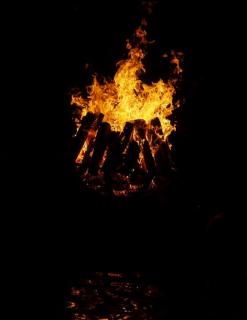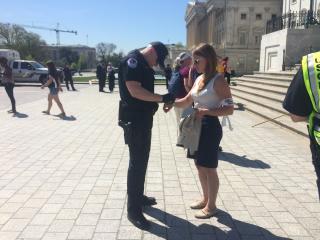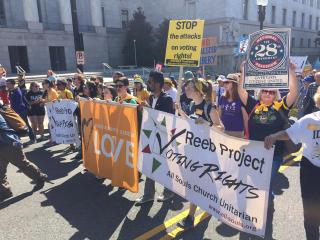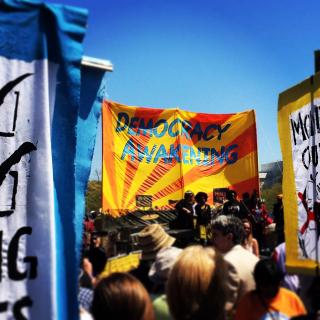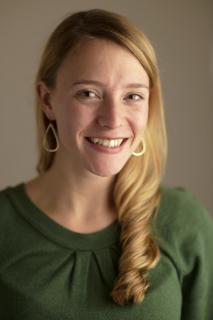Fiercely UU: Sitting in for Democracy
By Annie Gonzalez Milliken
Fiercely UU is a blog series where Unitarian Universalist (UU) young adults tell stories about what our faith requires of us and how they follow that call. To be fiercely UU is to proclaim human worth and interdependence. In an individualist, greed-based, shame and fear fueled white supremacist patriarchy, we say no to isolation and oppression and yes to radical love and covenanted connection. – Ed.
Our Fifth Principle and Sitting in for Democracy
by Laura WilliamsonLast month I sat on the steps of the U.S. Capitol with 300 others singing, chanting, and eventually being arrested, to send a message to Congress: amend the Constitution to get big money out of politics and restore the right to vote for all Americans. With our arrests, we joined hundreds of others—including many Unitarian Universalists—who were arrested as part of the Democracy Spring and Awakenings. Over the course of several days, people from all over the country came together for a historic march from the Liberty Bell to Capitol Hill, a mass democracy teach-in at All Souls Church Unitarian, and one of the largest acts civil disobedience our nation’s capital has ever seen; all told, more than 1,400 people were arrested as part of an effort to save our democracy.
I was moved to join the Democracy Spring and Awakenings through my commitment to our Fifth Principle: the right of people of conscience and the use of the democratic process within our congregations and society at large. As I marched to the Capitol and occupied those steps alongside so many people of faith and conscience, that right—and, I believe, the responsibility that goes along with it—took on new meaning for me. In particular, my spirit was buoyed thinking of the rich legacy of civil disobedience in our country, and I was struck by the central role faith has always played in grounding and driving these actions.
I thought of the freedom fighters of the Civil Rights Movement, individuals whose sense of justice, often rooted in their faith, led them to risk far more than arrest in the struggle for the right to vote. I imagined the brave American heroes who, more than half a century ago, followed their spiritual leaders across the Edmond Pettus Bridge demanding the right to vote, an act of moral courage that ultimately propelled Congress to pass the landmark 1965 Voting Rights Act. I channeled James Reeb, former associate minister of my church, All Souls Church Unitarian, and namesake of our Reeb Project for Voting Rights. In March 1965, Reeb joined fellow UU Viola Liuzzo and several other people of faith in answering Rev. Martin Luther King Jr’s call to come to Selma; both Reeb and Liuzzo were martyred as they lived their faith through the struggle for the right to vote.
I thought about my ancestors, working class Quakers who, a century earlier, joined the abolitionist movement and defied federal fugitive slave laws by housing runaway slaves for a night or two along their journey to freedom. Like those rallying at the Capitol this week and crossing the bridge in Selma, they were people of conscience who recognized the urgent need to take action.
And I thought about North Carolina (NC), my home state and home to perhaps our most powerful contemporary model for faith-based organizing and civil disobedience, the Moral Monday Movement, through which well over 1,000 people have been arrested protesting the state’s unjust and immoral laws. Moral Mondays is led by the incomparable Reverend William Barber the II—President of the North Carolina NAACP and a “country preacher,” as he reminds us—who has moved thousands to action over the last few years and who was alongside us, and among the first to be arrested, that day on the Capitol steps.
To be clear, the risks we faced sitting at The Capitol were negligible compared to the dangers associated with civil disobedience over the course of our nation’s history. However, the imperiled state of our democracy today must be taken just as seriously, and our faith calls us to act just the same. In 2010, the Supreme Court decided in Citizens United v. FEC that corporations could spend unlimited amounts of money to influence our elections, and three years later in Shelby v. Holder it held that the protections of the 1965 Voting Rights Act for which so many fought and died during the Civil Rights Movement were no longer necessary. Both decisions delivered devastating blows to our democracy, but from both new movements of conscience have been born. And, in keeping with our nation’s and our justice movements’ traditions, we are again seeing faith communities—including so many UUs—take the lead in making clear that we understand the power of civil disobedience and take seriously our nation’s legacy of social change through resistance.
Congress has the power to act and the tools at its disposal—including the Democracy For All Amendment and the Voting Rights Advancement Act—to restore our democracy to the people. Each day Congress does not act, we will lean further into our Fifth Principle; our movements will grow stronger, our tactics bolder, and our voices louder, until we achieve that promise of democracy that works for all of us, upon which our nation was founded and for which so many have fought.
Laura Williamson is a Master of Public Affairs candidate at the Woodrow Wilson School for Public and International Affairs, where she studies voting rights and democracy. Previously, Laura supported the development of the newest generation of social justice leaders in the United States as the Fellowship Program Manager and then Interim Director of Young People For, a program of People For the American Way Foundation. She also led programmatic advancement and resource development for Young People For and its sister program, the Young Elected Officials Network, building relationships and support for both programs’ work in the philanthropic community. Laura also worked as the Education Outreach Coordinator at Puentes New Orleans—a nonprofit organization working with the Latino community to demand the inclusion of Latinos in public, political, and socio-economic life—in which role she coordinated leadership development programming and supported high school students organizing for racial and economic justice. A native North Carolinian, Laura is a graduate of the University of North Carolina at Chapel Hill, where she majored in English and International Studies. She also spent a year doing graduate coursework in public policy and social planning at La Universidad Nacional de Cuyo in Mendoza, Argentina.
